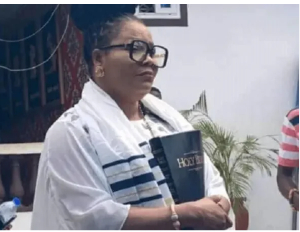Mr. Jake Obetsebi-Lamptey, Outgoing Minister of Information and Presidential Affairs, on Saturday said that government fully supports the proposal to upgrade the Ghana Institute of Journalism (GIJ) to a tertiary level under the Ministry of Education.
To this effect, he said, a new Legislative Instrument had been developed to rename the Institute as "College of Journalism" to give it a new image and a new orientation.
Mr. Obetsebi-Lamptey was speaking at the 42nd graduation ceremony of the Institute under the theme "Towards an Improved Economy: The Role of the Communications Professional" in Accra. One hundred and sixty-five students graduated in the 2002 academic year in both Diploma in Journalism and Public Relations and Advertising.
Miss Abigail Gyimah and Mr. Divine Daflagbe were adjudged the overallbest Diploma students in journalism and Public relations respectively. They both took home 500,000 cedis each, a set of books and certificates.
Miss Gyimah stole the show when she was awarded additional three prizes for being the best student in Social studies, Journalism as a subject and the most promising female student journalists.
The Minister announced that agreement had been reached with the Parliamentary Select Committee on Information to move to amend the law establishing the GETFUND to enable GIJ to benefit from it. He reiterated government's commitment to lay a concrete foundation for professionals though academic training and qualification to enable them to perform their duties accurately to support the economy.
"Education and training constitute the first step in the life of the would-be professional. Beyond these, however, there is the need for actual utilisation of skills acquired over the years," he added.
Mr. Obetsebi-Lamptey advised the graduands not to be satisfied with mere acquisition of knowledge in school, but to continue to use and develop their knowledge to achieve positive results. He said the real challenge facing the communication profession begins after school and "it is when you are able to continually and persistently develop your skills as a practitioner that you can be said to be a real communication professional”.
“The challenge of professionalism is a challenge to the individual. Inorder to become a good professional the individual must have passion. It is passion that serves as a driving force in any professional. "Mr. David Newton, Director of the GIJ, said despite the numerous problems the Institute was able to accomplish its targets and expand itscope to include Science and Technology reporting to encourage specialisation.
He said since the inception of the institute some 44 years ago, it had been fulfilling its mission of producing Journalists and Public Relations practitioners under very trying conditions. He mentioned the lack of infrastructure and equipment as a major drawback clipping the Institute's efforts to train communication professionals, because the institute had never received adequate funding to enable it undertake any meaningful expansion and improvement of training facilities.
Mr. Newton said the role of communicators in promoting good governance and national development was crucial, noting that the media was expected to initiate and encourage popular participation in decision-making, knowledge sharing and empowerment to facilitate efforts for development and growth by individuals, groups and communities.
"National and international issues are affected, influenced and shaped by media practitioners. Any nation or organisation which ignores this power does so at its own peril," he added.
The Director stressed the need to adequately resource communication training institutions to enable them to give off their best, adding that communication has an enormous power and responsibility, which require that journalists should be well trained in all aspects of the profession.
Mr Godwin Narh, SRC President, appealed to the government to improve the condition of service of the lecturers at the institute to entice others to accept appointment there. He said the lecturers' salaries were nothing to write home about and because of that the few of them were leaving and new ones were not accepting appointment to the institute.
He appealed to both old students and the Ghana Journalists Association to rescue the institute from total collapse. Mr Kweku Osei Bimpong, President of Institute of Public Relations, urged NGOs and other professional bodies to join hands with the authorities to bring the institute back to its former glory.
General News of Monday, 14 April 2003
Source: GNA












